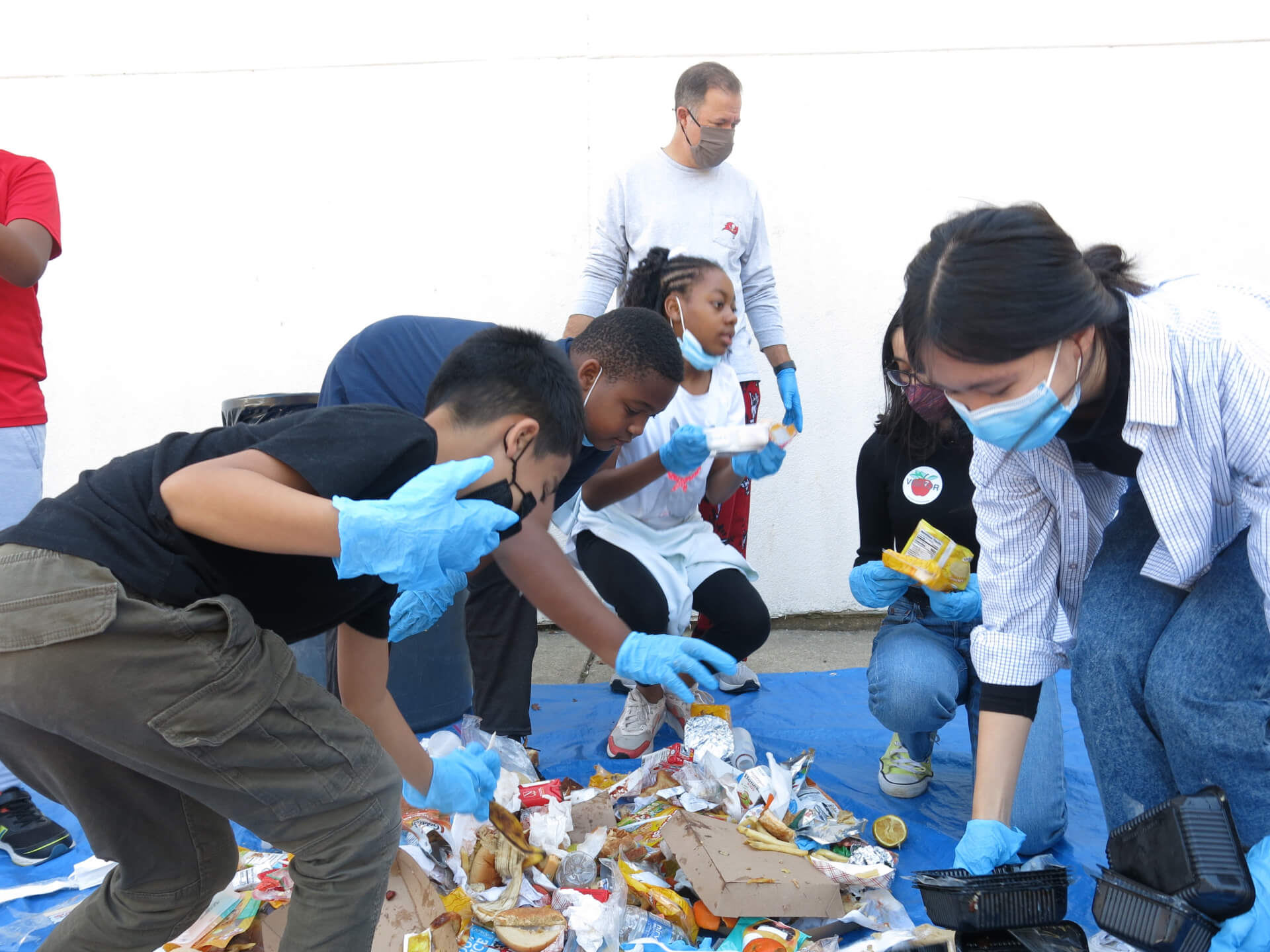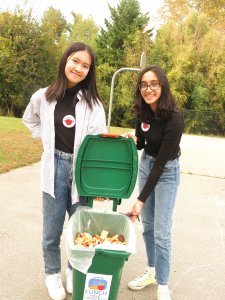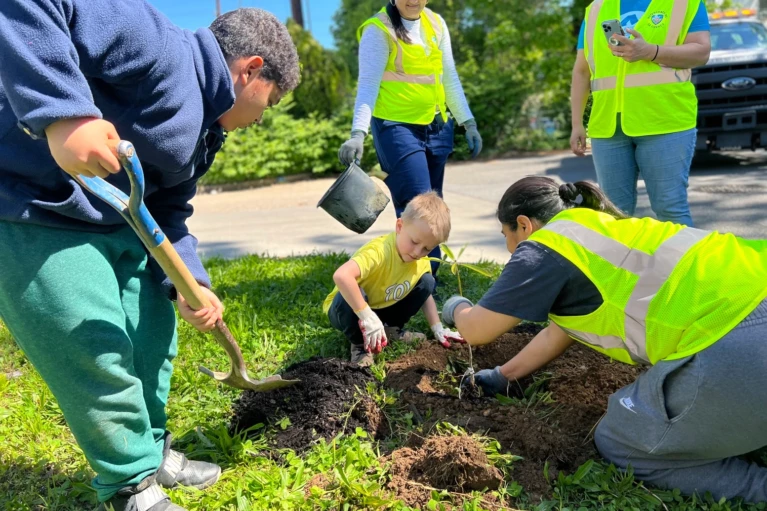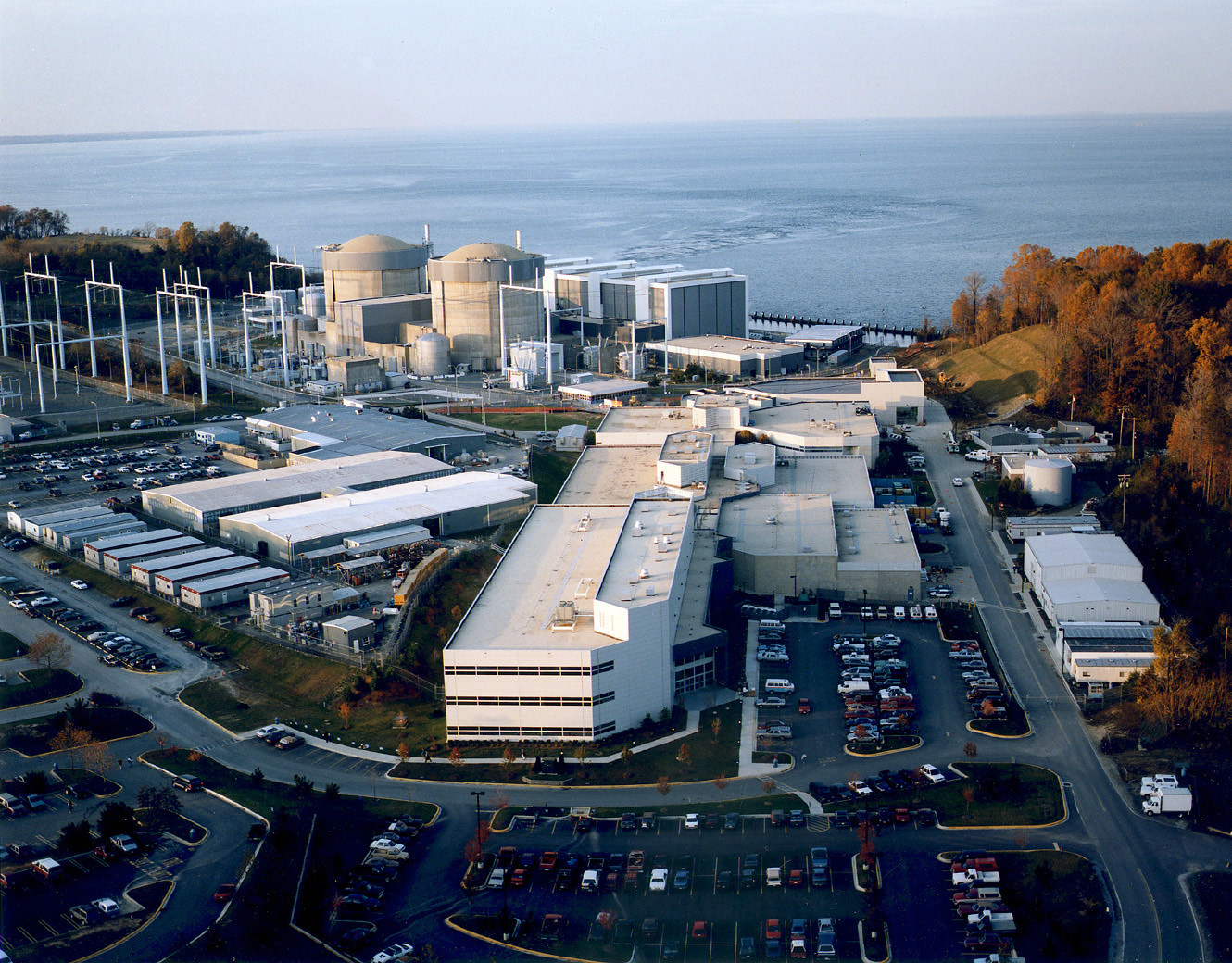Waste Warriors: Student Coalition Awarded $48,000 to Re-Imagine School Food Trash

As international leaders remain engaged in UN climate talks, five Montgomery County students from two high schools are putting their heads together to talk trash.
“There needs to be change, so, we decided to step up,” said Ethan Weiss, 17, a senior at Bethesda-Chevy Chase High School. Weiss is disturbed by a warming planet and sees composting as a way to address climate change locally.
Jack Clauss, 18, also a BCC senior, co-founded BCC Capital Compost with Weiss and Micah Schuchman, but also wanted to do more.
“There’s so much waste being thrown into landfills, and it’s contributing so much to our carbon footprint,” said Clauss.
The U.S. Environmental Protection Agency finds landfills among the largest sources of methane, a far more potent greenhouse gas than carbon dioxide.
The U.S. Department of Agriculture estimates that the U.S. wastes about a third of its food supply. The nation’s schools alone spend $9.7 million dollars a day to manage food waste, according to the World Wildlife Fund. Those figures could be dramatically reduced through recycling, composting and food recovery.
Students bring compost culture to school
This summer, students from BCC and Richard Montgomery High School formed the Coalition to Re-imagine School Waste.
Among them are Angelina Xu, 15, and Advika Agarwal, 15, both sophomores at Richard Montgomery who started a compost program at Clarksburg Elementary while they were in middle school. They later formed the Compostology club in high school.
“It’s astonishing how much waste students produce each day,” Xu said.
Agarwal said she learned the value of composting from her Indian parents.
“In [India], wasting food was so frowned upon with so many starving families close by. And, when my parents immigrated to America and saw families wasting food, they were just outraged,” she said.
The Coalition to Re-imagine School Waste is now working to re-direct mounds of uneaten packaged fruit, vegetables, juice and milk cartons thrown away every day in school cafeterias from landfills and incinerators. The effort could also help schools save money by cutting costs for hauling trash.
In August, the student coalition received a $48,000, two-year grant from the World Wildlife Foundation’s Food Waste Warrior Program.
“We intend to prove that addressing school food waste is not only a powerful and morally responsible way to reduce greenhouse gasses emitted from our Maryland incinerators and landfills, but that composting can be cost neutral, [and] easily woven into climate science and ecosystems curriculum,” the students wrote in their application.
The student coalition proposed setting up compost programs in eight Montgomery County public schools, among them Title I schools, where at least 40 percent of the students come from low-income families.
“We’re trying to show that this is not only for those schools that are well off, with PTAs that have deep pockets, but that anyone can do this. The tough part is getting it implemented,” Clauss said.
Green light to re-imagining waste
During a recent weekly check-in among coalition members, the teens reported working to sign up schools, and all the logistics of getting a program running including getting buy-in from principals, the PTAs, and science teachers who can champion the program. They also reported recruiting and training high school student ambassadors to help, and putting together a step-by-step guide to effectively implement the program.
The students said their success will lie in proving that the program works for the environment and the bottom line.
“Pretty much we want to collect data and bring it to [Montgomery County Public Schools] after two years and say, ‘Look at this data. We should compost. [You should] fund this!” Clauss said.
The Coalition found an ally in Joe Richardson, the director of Mountainside Education and Enrichment, a non-profit that runs outdoor education programs from the Bar-T Mountainside Summer Camp in Frederick. He has also been instrumental in Frederick County’s commitment to fund waste diversion and food recovery in 23 schools.
Richardson’s non-profit agreed to be the financial agent and oversight director for the Coalition.
“I am trying to make students solutionists. Let’s give them fundamental tangible solutions that have a significant impact in the understanding of our consumption, the impacts of it, and the importance of getting organics out of the waste stream,” he said.
He is also teaching them how to run a waste audit to quantify the results.
Getting hands-on data on what’s in trash
On a recent school day, Agarwal and Xu met Richardson at DuFief Elementary in Gaithersburg, where the trio had been called in to re-launch the school’s compost program, which had started in 2018, but stalled during the pandemic. With financial support from the Gaithersburg Rotary Club, they revived it.
During lunch, the 300-plus students separated recyclables, liquids, trash and food waste into separate bins.
Then the audit began.

Angelina Xu (left) and Advika Agarwal (right) carry compostable food scraps after a trash audit at DuFief Elementary School in Montgomery County. The high school students are part of the Coalition to Re-Imagine School Waste which aims to curtail landfill-bound trash at Montgomery County Public Schools. Photo by Rosanne Skirble.
Each bin was weighed and then dumped on a large blue tarp to be sorted. Unopened milk cartons and clean paper trays were separated from the half-eaten fish fillets, french fries, fruit, and piles of buns. Plastic wrappers were removed from packages of unwanted carrots.
“The recycling is pretty good,” Ricardson observed. “We’re going to see a lot of organic material in the trash cans and we’re going to get it out,” he said, working with Agarwal and Xu alongside the principal, teachers, and DuFief’s School Energy and Recycling Team in blue rubber gloves.
After the sort, the bins were weighed again, and the results compared.
The school did remarkably well: “86% of the waste could recycled or composted to make new organic dirt,” Agarwal said.
Scaling up
But this is just the beginning.
“We want to show the power of composting and we’ll pay for it, collect data and then show others how impactful it actually is,” said Weiss.
Xu hopes the project gains traction beyond the first eight schools. “We definitely hope it to be bigger, scaled up, and [we want] a greater awareness, both from the Board of Education and the County as a whole, [engaging] a larger range of people to share what they want in the future.”
Montgomery County requires recycling, but not composting, in each of its schools, something the students hope to change with the grant.
“The students are amazing. I’m really excited about this, really being able to support and push and create opportunities in these schools,” said Maryland Del. Lorig Charkoudian (D-Montgomery) who shepherded a bill that became state law in 2021 to require large-scale food generators like hotels, restaurants and supermarkets to compost. She has plans to introduce a statewide school composting bill in the next legislative session.
Over the course of the project, students are meeting public officials, testifying before the Montgomery County Board of Education, and interacting with administrators at all levels of county government.
Along the way they are also seeing that they have a voice.
“Completing an action that precedes the legislation is a very valuable change of mindset for me to see that it’s not enough to just talk about issues, you have to put in the work to make those changes and inspire your legislators to listen to you,” Agarwal says.





 Creative Commons Attribution
Creative Commons Attribution